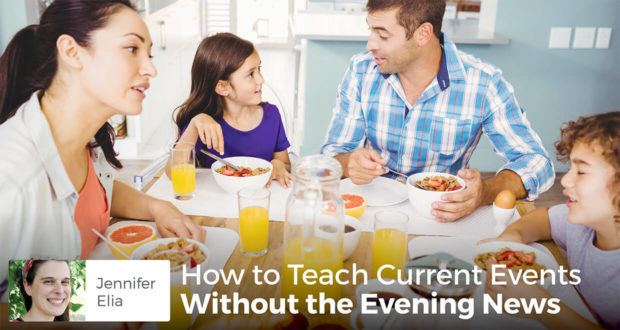Summary
Understanding current events is essential to the learning process, but as Jennifer Elia explains, parents should be the newscasters for their children.There is a lot going on in our world today, and for us to raise responsible and well-rounded citizens, our children need to understand the world beyond their front door.
However, a 24-hour news cycle was not designed for young minds and hearts. Here are five tips for teaching your children about the current events in a loving, Christ-centered way.
1. Stay Informed.
Stay on top of current events yourself and make sure you know as much as you can about important news stories. There are times I would rather avoid the news altogether. It can be depressing and difficult to handle, even as an adult.
However, it is important to know what is going on in our world. An informed citizenry is better able to elect responsible leaders, react to tragedies in a charitable and productive way, and understand how and why other major world events are occurring.
While ignorance may seem to be bliss, it is not a state that we are called to occupy. For us to be effective parents, citizens, and Christians, we must keep our ears and eyes open. Stay tuned-in to current happenings and look for multiple reliable sources for pressing issues or high profile events.
Follow up on events that you deem important, even once they have been pushed off the front page. Make it a point to educate yourself first.
2. Act as a filter.
Children are sponges; they soak up even what they don’t understand. While we have to keep our children informed, as well as ourselves, we also have a duty to protect them. Decide how much your child really needs to know.
With our constant access to media and communication there is more coverage of more events than ever before. While every crime and tragedy is important, it doesn’t all have to make it to your dining room table.
On September 11, 2001, I was a public school teacher, just fifty miles from the tragedy in New York City. One of my young students, only about seven, came in with wide, scared eyes the next day and said, “They just keep hurting our buildings, the whole city is almost gone.”
He didn’t understand that the endless loops of the attack were of a single event. In his world it was happening over and over every few minutes.
As a rule, in our home, we do not listen to or watch any news programs with the children present. It is too hard to predict what will be discussed, and even worse, displayed.
Just as we don’t allow our children unbridled access to the internet and we do preview movies and books, we preview the news, do our research, and discern what, if anything, our children really need to know about what is going on. For your children’s sakes, filter out the fluff, the anti-Christian messages, as well as the sensationalism, and give them only bite-sized snippets of what is truly newsworthy.
3. Discuss at an age appropriate level.
We live in an unpredictable world. Terrorism is the scourge of our time. My children have not lived through an earth shattering day such as 9/11, but they still need to be aware that there are groups of people who wish to harm our country. How much they need to know, though, depends upon their age.
Our newly turned three-year-old son just needs to know that there are people who do the wrong thing or try to hurt other people, but that our civil servants, like the police, work hard to protect us.
On the other hand, our almost twelve-year-old has been part of our discussions on the upcoming election and the persecution of Christians in the Middle East, (filtered still, of course).
Remember that you can always add more details if the child is truly ready for it or is searching for answers. However, information cannot be taken back. While all of our children know that there are martyrs even today, and that we need to stand up for our faith, we do not go into the grisly details of how the people were martyred.
4. Relate current events to your history lessons.
It’s been said that there is nothing new under the sun. Everything that we are dealing with now has been going on, to some extent, since the fall of Adam and Eve.
Studying history, especially Church history, shows how people have overcome challenges in the past, and that we can learn from knowing history well. Those who don’t learn it are doomed to repeat it, after all.
There are many modern concerns that hit the news–Christian persecution, wars, economic crisis, slavery, natural disasters, crime–that relate to the lessons we are already studying in history. In an age appropriate and filtered way, you could connect St. Patrick being taken prisoner and sold as a slave to the kidnappings and abuse perpetrated by ISIS today.
Likewise, discussing the Great Depression can lead to a look at why there are so many foreclosed homes in your area, and a talk about using treasures responsibly. History truly is a circle, and though the events of today feel particularly intense, that doesn’t mean we cannot still learn from history.
There is also comfort for children and adults in knowing that bad things have happened in the past, but that great men and women have found a way through them by the grace of God.
5. Remind everyone that this is a fallen world, but our hope is in the LORD.
My husband has a saying: “Not our kingdom, not our home.” As distressing as current events can be, we need to remember that the LORD is still in charge, and wants us to have peace, not anxiety. It can be difficult to understand why, and there are many whys that have no reasonable answer other than that this is a fallen world.
Yes, God still loves us and is with us through it all. However, once sin entered the world, so did destruction and suffering.
Pray for resolutions to tragedies, both natural disasters and man-created chaos, but realize that the course of history rests in God’s perfect hands. It may never make sense why or how things have been allowed to happen, but trust that it is all a part of His Plan.
Assure your children that our goal is to make it to Heaven where there is no suffering, no tears, no crime, no disasters. We must do our part to help others, but must never lose sight of our eternal home.
For in the end, no matter what happens in our world today, Jesus still rose, and God has already won!
Header photo CC WavebreakmediaMicro | adobestock.com

 Seton Magazine Catholic Homeschool Articles, Advice & Resources
Seton Magazine Catholic Homeschool Articles, Advice & Resources

